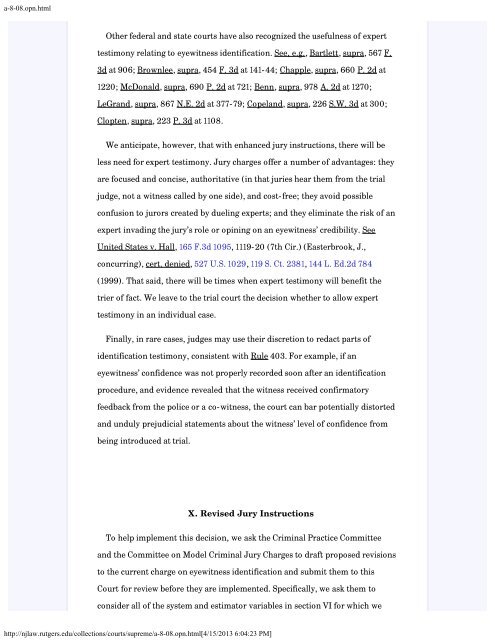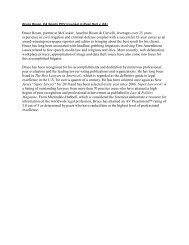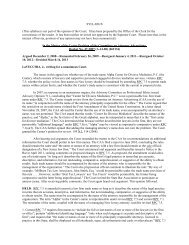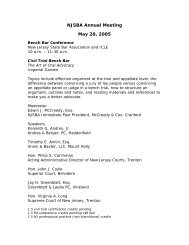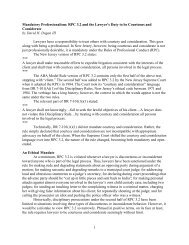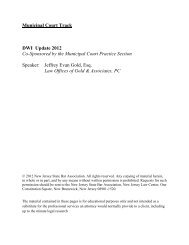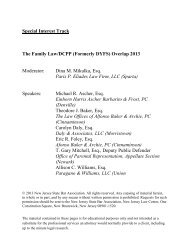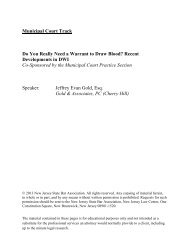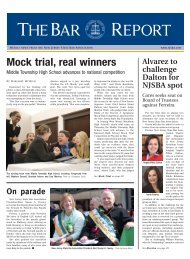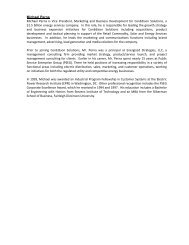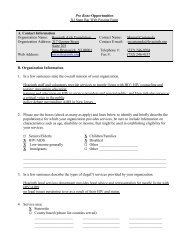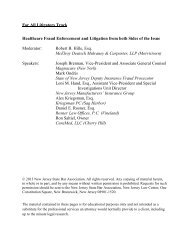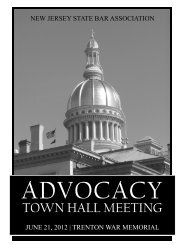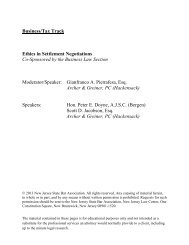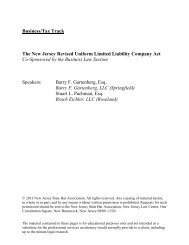State v. Henderson and the New Model Jury Charges - New Jersey ...
State v. Henderson and the New Model Jury Charges - New Jersey ...
State v. Henderson and the New Model Jury Charges - New Jersey ...
You also want an ePaper? Increase the reach of your titles
YUMPU automatically turns print PDFs into web optimized ePapers that Google loves.
a-8-08.opn.html<br />
O<strong>the</strong>r federal <strong>and</strong> state courts have also recognized <strong>the</strong> usefulness of expert<br />
testimony relating to eyewitness identification. See, e.g., Bartlett, supra, 567 F.<br />
3d at 906; Brownlee, supra, 454 F. 3d at 141-44; Chapple, supra, 660 P. 2d at<br />
1220; McDonald, supra, 690 P. 2d at 721; Benn, supra, 978 A. 2d at 1270;<br />
LeGr<strong>and</strong>, supra, 867 N.E. 2d at 377-79; Copel<strong>and</strong>, supra, 226 S.W. 3d at 300;<br />
Clopten, supra, 223 P. 3d at 1108.<br />
We anticipate, however, that with enhanced jury instructions, <strong>the</strong>re will be<br />
less need for expert testimony. <strong>Jury</strong> charges offer a number of advantages: <strong>the</strong>y<br />
are focused <strong>and</strong> concise, authoritative (in that juries hear <strong>the</strong>m from <strong>the</strong> trial<br />
judge, not a witness called by one side), <strong>and</strong> cost-free; <strong>the</strong>y avoid possible<br />
confusion to jurors created by dueling experts; <strong>and</strong> <strong>the</strong>y eliminate <strong>the</strong> risk of an<br />
expert invading <strong>the</strong> jury’s role or opining on an eyewitness’ credibility. See<br />
United <strong>State</strong>s v. Hall, 165 F.3d 1095, 1119-20 (7th Cir.) (Easterbrook, J.,<br />
concurring), cert. denied, 527 U.S. 1029, 119 S. Ct. 2381, 144 L. Ed.2d 784<br />
(1999). That said, <strong>the</strong>re will be times when expert testimony will benefit <strong>the</strong><br />
trier of fact. We leave to <strong>the</strong> trial court <strong>the</strong> decision whe<strong>the</strong>r to allow expert<br />
testimony in an individual case.<br />
Finally, in rare cases, judges may use <strong>the</strong>ir discretion to redact parts of<br />
identification testimony, consistent with Rule 403. For example, if an<br />
eyewitness’ confidence was not properly recorded soon after an identification<br />
procedure, <strong>and</strong> evidence revealed that <strong>the</strong> witness received confirmatory<br />
feedback from <strong>the</strong> police or a co-witness, <strong>the</strong> court can bar potentially distorted<br />
<strong>and</strong> unduly prejudicial statements about <strong>the</strong> witness’ level of confidence from<br />
being introduced at trial.<br />
X. Revised <strong>Jury</strong> Instructions<br />
To help implement this decision, we ask <strong>the</strong> Criminal Practice Committee<br />
<strong>and</strong> <strong>the</strong> Committee on <strong>Model</strong> Criminal <strong>Jury</strong> <strong>Charges</strong> to draft proposed revisions<br />
to <strong>the</strong> current charge on eyewitness identification <strong>and</strong> submit <strong>the</strong>m to this<br />
Court for review before <strong>the</strong>y are implemented. Specifically, we ask <strong>the</strong>m to<br />
consider all of <strong>the</strong> system <strong>and</strong> estimator variables in section VI for which we<br />
http://njlaw.rutgers.edu/collections/courts/supreme/a-8-08.opn.html[4/15/2013 6:04:23 PM]


